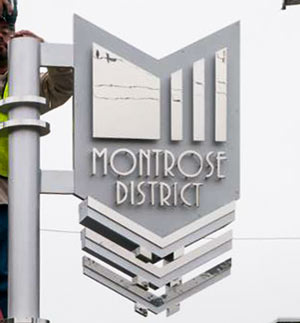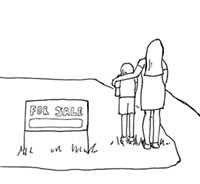ENOUGH SQUARE FOOTAGE TO QUIBBLE OVER “We bought a fairly new house this year. We were all surprised when the appraiser’s square footage was 7 percent (200 square feet) smaller than what they had listed on HAR. Turns out the builder built the original owners a smaller house than they paid for. Some of their original closing documents showed the smaller square footage, but others had the larger number, so we understood why they were confused. We adjusted our offer price based on the revised square footage and called it good. . . . BUT as it turns out [the original owners] had been paying property taxes on the larger square footage. Now it’s our turn to pay the property taxes and I’d like to get the square footage corrected. Our estimate is that we’ll be overpaying by $600 this year if the error isn’t fixed. Unfortunately, I’m reading this information [PDF] from the HCAD website. I’m not sure whether this is a ‘clerical error’ or a ‘substantial error.’ For a substantial error, you apparently can’t protest unless the error causes the property to be over-appraised by more than one third (!). And for clerical errors, they say that inaccuracies in estimation such as estimating the square footage of a house, cannot be changed. I’m guessing I could push this as a clerical error (tell them they must have transposed some numbers when filling in their system). Has anyone done this with success? Or are we just screwed?” [Swamplot inbox; previously on Swamplot]




When I bought my house, the property taxes seemed insane for my square footage, so I protested my taxes only to learn that about 800 square feet hadn’t been included in the county’s earlier estimate.
As it was an REO property I imagine I got quite a deal on the house because the bank probably used county numbers to come up with a price…
You may need to confirm how the SF is measured. There is no agreed upon way to measure residential buildings. Are you measuring to the exterior face of the walls? The gross SF can easily be 10% more than the interior net building SF. Also, I did not think taxes were based on SF, but based on value of the house. SF value is only used as a guide, as certainly houses in more expensive neighborhoods would have a higher SF value, and lot size will affect value of a property regardless of the SF.
You can always correct a clerical error. However, in order to correct square footage, you usually need to prove that the error is more than 10%. You will need a copy of your appraisal with the map showing square footage. If it’s very obvious, they might correct it without you having to file a correction protest.
First, there are various methodologies that can be used to calculate square footage of a house. Builders often use the methods that result in the highest number. Marketing 101. HCAD uses their own method. There’s more than one correct answer.
If you protest your appraised value based on inaccurate square footage, HCAD will send an appraiser out to remeasure your house. HCAD will then use the new number to calculate your value.
Also, do not expect a linear change in value based on a reduction in size. Square footage is but one of many factors that affect the value of a home.
First of all, this is just my conjecture, because I am not a lawyer…
My thought would be that you cannot protest or change the 2012 appraisal that determines your taxes due on Jan 31, 2013. You should be able to protest your appraisal when the new ones come out this summer, since it will be your first time as owner of the property ( assuming you purchased after June) to protest. Take all your appraisal documents, along with the title transfer and how much you paid for the house. I’ve found that if you have information in hand to prove your point, HCAD is usually pretty easy to work with.
Also, your case is not that unusual, I’ve known some others that had appraisal work done that found 200 sq. foot or greater errors in what HCAD and HAR told them was the size of a house for sale.
Not to be a grammar nazi, but you protest your market value for property taxes, not your appraised value. Your appraised value can only be protested if there is a problem with how your homestead exemption has been applied.
Also, look at the HCAD page for your home to see what the actual value of the home vs. the land is (i.e. is the value of the home/”improvement” negligble vs. the value of the lot/”land”), and then decide whether that’s enough to raise the issue.
As earlier posters have noted, if you think you are going to get your entire tax value adjusted by the ratio of “actual” area to “appraisal” area, you will be disappointed.
The best evidence of value is what you just paid for it. Is that more, or less, than what is on the tax rolls now? If you paid more, HCAD will be happy to adjust your valuation upward I am sure. If less, logic would indicate that the value should be adjusted downward, but that may be somewhat less likely.
And the point about land value vs. structure value is also a material issue. Most neighborhoods have an established lot value algorithm, in the eyes of HCAD. I know mine does. Land value could be a substantial portion of the property value, and has nothing to do with the size or condition of the structure that might be present.
Good luck!
It wouldn’t surprise me if they get square footages based on satelite photography. They were talkikng about doing this for the COH drainage fee.
.
One of our houses is listed at over 1,650 sf on HCAD. When I bought it I took measurements and drew the house in CAD. The area that my drawings gave me was only about 1,400 sf. My only guess is that they must have counted the car port as building square footage – and I didn’t.
I highly suggest that contrary to a previous post, you NEVER allow an HCAD appraiser come into your home, it can only lead to HCAD deciding that they were under valuing something about your home. HCAD will never enter your home and decide that they have over valued your home. Additionally, if you paid anything over the current assessed value, DO NOT provide your settlement statement regardless of what HCAD tells you that you must do.
We built a new house in the Montrose area a few years ago. When HCAD prepared our first tax bill, the square footage listed was over 1000 sf more than what we had.
At our protest, we were told that HCAD’s sf was an estimate from an aerial photo and assumed our house was 2 stories, when it is actually 1 1/2.
I took my builder’s full set of building plans to my protest, and they agreed that there was a problem, but they would not agree to use the plans. They insisted on sending an appraiser to measure every square inch of our home. The number they came up with was less than our builder’s number, which means (a) our builder got creative with our square footage, and (b) there are some honest appraisers working at HCAD.
What does the floor plan drawing show at the HCAD? Back when they posted the floor plans online,(now you have to go to their office to see the floor plans) I realized that HCAD had an incorrect floor plan for my house, increasing the square footage by about 186 sqft, on a 3000 sqft house. They considered my second story to be larger than it actually is. On the protest hearing, I showed them 3 other homes with the same floor plan as mine, and their sqft were all right around 3000. They changed mine with no problem and dropped my value to the average of the 3 homes, but because the difference was less than 10%, I could not challenge the prior year taxes.
And my sister in law had the same thing happen to her house in Fairfield. The HCAD floor plan showed that they had an optional 4th bedroom on their house, when it was not something the house had. Apparently the appraiser just assumed it was the same plan as another in the area that did have the 4th bedroom. They got about 250 sqft dropped from their house and their value was dropped also.
HCAD has floorplans? I didn’t know that. On HCAD a townhome of mine in Montrose shows it as the smallest of the group, when actually it’s about 300 SF larger than any other in the group. I haven’t bothered to correct it (for obvious reasons).
.
Having a low HCAD is great till you want to sell, then you get buyers who say “Why are you selling it for $x when HCAD has it at…” Trying to explain that this is a positive for them is pointless.
.
The last property we bought had an HCAD value of just under half what we paid. That fact saves us about $1,300/month